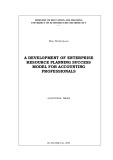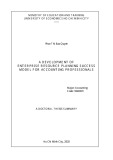
ABSTRACT
Enterprise Resource Planning (ERP) system is commercial software that
automates and integrates many or most of a firm’s business processes. It
allows to access to integrated data cross the entire enterprise according to real-
time (Davenport, 1998). Therefore, ERP system is expected to increase
productivity via processes standardization, to improve decision-making ability
via information integration throughout the whole enterprise, to enhance
cooperation between organizational entities by connecting them smoothly, and
the most important, to maintain competitive advantage once these benefits are
satisfied (Davenport, 1998). These promises are possibly a close explanation of
its increasing popularity. Namely, Fortune 500 companies are trusting ERP
system1 and it is also a solution that large-sized organizations in Vietnam
select and adopt more growingly2.
Nevertheless, instead of achieving impressive benefits from their ERP systems,
some firms have faced difficulties in gaining the benefits they expected.
Therefore, as suggested by Markus and Tanis (2000), for both researcher and
executives, one of the initial interested-questions is whether investments in
ERP will pay off. Several organizational-level econometric studies conducted
(M. C. Anderson, Banker, & Ravindran, 2003; Hitt, Wu, & Zhou, 2002) give
an answer that it is likely yes – on average. However, the impacts vary from
enterprise to enterprise, even from module to module (Nicolaou, 2004a) in
which accounting-related modules are in charge of changed-focuses. Kanellou
and Spathis (2013) perform the relevant literature and conclude that ERP
implementation has a considerable impact on accounting department of the
business organizations. Hence, the executives’ next questions are probably to
be, how can I maximize the positive impacts on accounting department? Is
there some way to predict what the ultimate impacts of ERP systems on
accounting professionals will be in order to achieve a goal of enhancing
organizational performance?
1 This information is quoted from website http://fortune.com/2017/09/13/amazon-microsoft-
google-sap-cloud/
2 This information is quoted from Vietnamese E-commerce Indicator Report in 2018.























